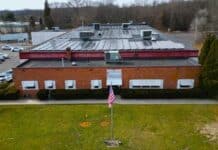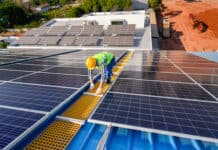
By Peter DeNapoli
Published in the March 2013 issue of Today’s Facility Manager
During 2011, the number of commercial solar installations in the United States increased by 127%. Today, facilities in this market host more than 800 megawatts of solar capacity. With government incentives reducing the cost of a solar installation by 30% or more, facility managers (fms) are poised to reap the benefits. With the money saved each year on utility bills, many achieve an after-tax return on investment of 15% to 25%.
One such business is Darden Restaurants, Inc., a full-service restaurant company whose brands include Red Lobster, Olive Garden, and LongHorn Steakhouse. In 2012, the company commissioned a 1.1 megawatt solar installation at its headquarters in Orlando, FL. Composed of 4,400 solar panels mounted atop the company’s Restaurant Support Center and parking structure, Darden’s solar system offsets about 20% of the company’s annual energy consumption at this campus.

Chase Brackett, manager of campus building services there, says, “Darden decided to go solar because we felt it provided real world environmental benefit as well as a positive return on investment. Simply put, it was the right thing to do.”
The system, developed by Florida-based contractor Kenyon Energy, has produced nearly 1.7 million kilowatt hours of energy in its first year. It also provides a shaded canopy to the top floor of Darden’s parking structure, an added benefit in sunny Florida. “The system has operated for the first year with no down time or warranty related issues,” says Brackett. “It has certainly exceeded our expectations for reliability and power production.”
Fms interested in solar need to be aware that all solar panels are not created equal. To ensure maximum financial return and reliable performance, fms should consider several aspects.
1) Choose a proven technology. Two main types of solar panels are crystalline silicon and thin film. Crystalline silicon panels have a higher energy yield than thin film, given the same area. And crystalline silicon panels have demonstrated superior real-life performance for three decades.
2) Choose high environmental standards, and investigate corporate sustainability claims. The Silicon Valley Toxics Coalition, a watchdog organization for the solar industry, releases a yearly Solar Scorecard, an independent report on the sustainability practices of manufacturers.
3) Choose an experienced manufacturer with a reliable warranty. Hundreds of solar companies are starting up today, and it can be difficult to differentiate among them. Fms should select a manufacturer they are confident will be capable of honoring warranties and service commitments for their duration.
4) To finance a project, options for fms include paying cash, securing their own financing, or obtaining solutions offered by manufacturers or installers. A capital lease, an operating lease, and a power purchase agreement (PPA) are three of the most commonly available tools.
A capital lease enables fms to divide their investments into monthly installments, much like a loan or a mortgage. Under this option, an organization can benefit directly from available tax credits and rebates. Meanwhile, an operating lease (similar to an auto lease) gives fms the chance to add solar with low monthly payments and then purchase the system at fair market value when the lease ends. With this option, the tax credits are taken by the lessor and incorporated into the lease payments, allowing fms lower monthly payments without tax complications.
With a PPA, instead of purchasing and maintaining solar equipment, fms can buy the power generated. A PPA company will install and maintain the system, and sell back electricity at a predetermined rate over a fixed time (usually 20 years). This structure allows a facility to benefit from solar, with no initial capital investment and minimal cash flow impact. PPAs are typically reserved for large businesses with very strong credit.
DeNapoli is manager of strategic sales for SolarWorld, a U.S. solar manufacturer for more than 35 years.



















![[VIDEO] Collect Asset Data at the Speed of Walking a Building](https://facilityexecutive.com/wp-content/uploads/2024/02/maxresdefault-324x160.jpg)
Even though solar panels are a little costly but they are very economical in if seen as long term investment. Also these are very easily available nowadays and Government orgs provides subsidies on them.